This Band Wants Your Respect
[Rolling Stone, 12th - 26th July 1990. Words: Jeff Giles. Pictures: John Stoddart.]
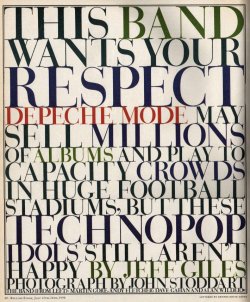
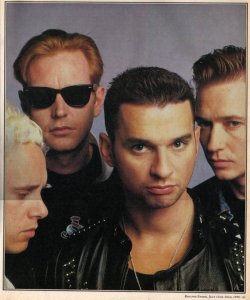
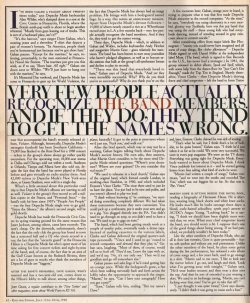
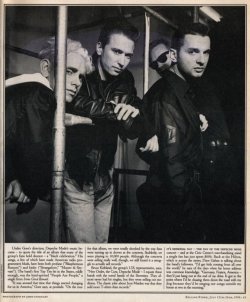
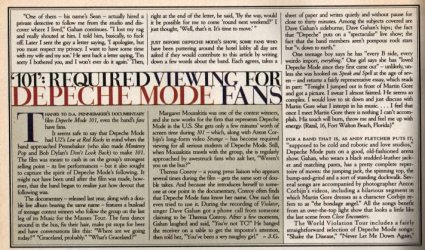
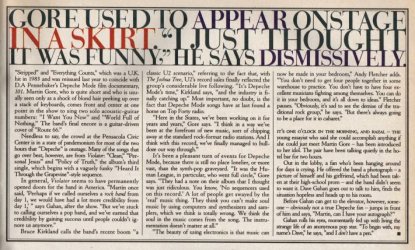
Depeche Mode may sell millions of albums and play to capacity crowds in huge football stadiums, but these technopop idols still aren’t happy.
“I’ve been called a faggot about twenty times today,” says Depeche Mode keyboardist Alan Wilder, who’s slumped down in a seat at the Civic Center in Pensacola, Florida, where the British synth-pop outfit is about to begin another rehearsal. “Mostly from guys leaning out of trucks. This is a sort of backward place, isn’t it?”
“It’s the haircut,” says singer Dave Gahan, who’s wearing jeans and a sleeveless T-shirt that depicts a pair of women’s breasts. “In America, people think you’re homosexual just because you’ve got short hair.” Gahan pauses. “Except for the marines,” he says, referring, presumably, to the men stationed at Pensacola’s Naval Air Station. “The marines just give you this wink, as if to say, ‘Short hair. All right.’” Gahan sits down next to Wilder. “We’ll just have to hang out with the marines,” he says.
It’s Memorial Day weekend, and Depeche Mode has come to Pensacola to gear up for World Violation, the tour that accompanies the band’s recently released album, Violator. Although, historically, Depeche Mode’s strongest foothold has been Southern California – 75,000 fans flocked to the Rose Bowl for a 1988 concert – tickets to the group’s shows always go rather quickly everywhere. For the upcoming tour, 18,000-seat arenas in Dallas and Chicago sold out within a week. Stadiums in Orlando, Tampa and Miami have also sold out, despite the fact that the band has never played Florida before and gets virtually no radio airplay there. And 42,000 tickets to Depeche Mode’s New York-area show, at Giants Stadium, were sold in a single day.
What’s a little unusual about this particular road trip is that Depeche Mode’s albums are starting to sell as well. Violator is the group’s first record to sell a million copies in the States, and “Personal Jesus” – the band’s only hit here since 1985’s “People Are People” – was the first Depeche Mode single ever to go gold. “Enjoy The Silence”, the album’s second single, will be gold shortly.
Depeche Mode has made the Pensacola Civic Center its spring training ground for the same reason that Janet Jackson, among others, came here recently: The rent’s cheap. On the downside, unfortunately, there’s the fact that the only club the group has found in town has a mirrored ball and a DJ who struts around in a tux; the fact that the “security guard” at the Pensacola Hilton is a Depeche Mode fan who’s spent most of his time asking for free concert tickets and eight-by-tens of the band; and, of course, the fact that in an area of the Gulf Coast known as the Redneck Riviera, there are a lot of guys in trucks who think the members of Depeche Mode are “faggots”.
After the band’s rehearsal, Dave Gahan, who’s married and has a two-year-old son, comes down to the Hilton’s lobby to talk about, among other things, the fact that Depeche Mode has always had an image problem. [1] He brings with him a bodyguard named Ingo. In a way, this seems an unnecessary measure. Apart from Depeche Mode’s devout followers – 15,000 of whom nearly caused a riot at a Wherehouse record store in L.A. a few months back [2] – very few people actually recognize the band members. And if they do, they tend to get the names wrong.
These days, Depeche Mode – which, in addition to Gahan and Wilder, includes keyboardist Andy Fletcher and songwriter Martin Gore – gives relatively few interviews. The band has been known to turn away journalists who haven’t pledged allegiance, as well as to boycott radio stations that balk at the group’s all-synthesizer format and decline to play its records.
“There was this band that everybody loved to hate,” Gahan says of Depeche Mode. “And yet they were incredibly successful. Why? Why do you think you’re so successful? Why do you think you’re on this planet, basically? It got to the point in interviews where we’d just say, ‘Fuck you,’ and walk out.” [3]
After this brief speech, which may or may not be a warning, Gahan begins talking freely about Depeche Mode’s ancient history. He even asks, then answers, what Martin Gore considers to be the most tired Depeche Mode-related questions: “Where’s your drummer Where are your guitars Do you consider this real music?”
“We used to rehearse in a local church,” Gahan says of the original band, which formed outside London, in working-class Basildon, in 1980, and which included Erasure’s Vince Clarke. “The vicar there used to just let us have the place. You had to be nice and polite, and you weren’t allowed to play too loud.
“I think without knowing it,” he continues, “we started doing something completely different. We had taken these instruments because they were convenient. You could pick up a synthesizer, put it under your arm and go to a gig. You plugged directly into the PA. You didn’t need to go through an amp, so you didn’t need to have a van. We used to go to gigs on trains.”
The band, which had been getting steady work at a couple of nearby pubs, eventually made a demo tape. Instead of mailing cassettes to the various labels, Clarke and Gahan delivered the original quarter-inch tape personally. “Vince and I used to go ’round to record companies and demand that they play it,” Gahan says, laughing. “Most of them, of course, would tell us to fuck off. They’d say, ‘Leave the tape with us,’ and we’d say, ‘No, it’s our only one.’ Then we’d say goodbye and go off somewhere else.”
Gahan pauses and asks Ingo if he’d mind getting him an orange juice. While the bodyguard’s gone, a fan who’s been walking nervously back and forth across the lobby takes the opportunity to approach the singer. “Martin,” he says. “Can I have your autograph? Have you got a pen?”
“Sure,” Gahan tells him, smiling. “But my name’s Dave.”
[Rolling Stone, 12th - 26th July 1990. Words: Jeff Giles. Pictures: John Stoddart.]
" Bruce Kirkland, the group’s U.S. representative, says, “New Order, the Cure, Depeche Mode – I equate these bands with the metal bands of the Seventies. They almost never had hit singles, but they were selling out stadiums. The classic joke about Iron Maiden was that they sold more T-shirts than records.” "
American article interviewing the band shortly before the kick-off of the World Violation Tour in Florida. As this is their first appearance since the band really made a name for themselves in the USA, the article takes them to be very much an unknown quantity, examining their misconceptions and cult appeal, and the fact that even the fans don't know their names...






Depeche Mode may sell millions of albums and play to capacity crowds in huge football stadiums, but these technopop idols still aren’t happy.
“I’ve been called a faggot about twenty times today,” says Depeche Mode keyboardist Alan Wilder, who’s slumped down in a seat at the Civic Center in Pensacola, Florida, where the British synth-pop outfit is about to begin another rehearsal. “Mostly from guys leaning out of trucks. This is a sort of backward place, isn’t it?”
“It’s the haircut,” says singer Dave Gahan, who’s wearing jeans and a sleeveless T-shirt that depicts a pair of women’s breasts. “In America, people think you’re homosexual just because you’ve got short hair.” Gahan pauses. “Except for the marines,” he says, referring, presumably, to the men stationed at Pensacola’s Naval Air Station. “The marines just give you this wink, as if to say, ‘Short hair. All right.’” Gahan sits down next to Wilder. “We’ll just have to hang out with the marines,” he says.
It’s Memorial Day weekend, and Depeche Mode has come to Pensacola to gear up for World Violation, the tour that accompanies the band’s recently released album, Violator. Although, historically, Depeche Mode’s strongest foothold has been Southern California – 75,000 fans flocked to the Rose Bowl for a 1988 concert – tickets to the group’s shows always go rather quickly everywhere. For the upcoming tour, 18,000-seat arenas in Dallas and Chicago sold out within a week. Stadiums in Orlando, Tampa and Miami have also sold out, despite the fact that the band has never played Florida before and gets virtually no radio airplay there. And 42,000 tickets to Depeche Mode’s New York-area show, at Giants Stadium, were sold in a single day.
What’s a little unusual about this particular road trip is that Depeche Mode’s albums are starting to sell as well. Violator is the group’s first record to sell a million copies in the States, and “Personal Jesus” – the band’s only hit here since 1985’s “People Are People” – was the first Depeche Mode single ever to go gold. “Enjoy The Silence”, the album’s second single, will be gold shortly.
Depeche Mode has made the Pensacola Civic Center its spring training ground for the same reason that Janet Jackson, among others, came here recently: The rent’s cheap. On the downside, unfortunately, there’s the fact that the only club the group has found in town has a mirrored ball and a DJ who struts around in a tux; the fact that the “security guard” at the Pensacola Hilton is a Depeche Mode fan who’s spent most of his time asking for free concert tickets and eight-by-tens of the band; and, of course, the fact that in an area of the Gulf Coast known as the Redneck Riviera, there are a lot of guys in trucks who think the members of Depeche Mode are “faggots”.
After the band’s rehearsal, Dave Gahan, who’s married and has a two-year-old son, comes down to the Hilton’s lobby to talk about, among other things, the fact that Depeche Mode has always had an image problem. [1] He brings with him a bodyguard named Ingo. In a way, this seems an unnecessary measure. Apart from Depeche Mode’s devout followers – 15,000 of whom nearly caused a riot at a Wherehouse record store in L.A. a few months back [2] – very few people actually recognize the band members. And if they do, they tend to get the names wrong.
These days, Depeche Mode – which, in addition to Gahan and Wilder, includes keyboardist Andy Fletcher and songwriter Martin Gore – gives relatively few interviews. The band has been known to turn away journalists who haven’t pledged allegiance, as well as to boycott radio stations that balk at the group’s all-synthesizer format and decline to play its records.
“There was this band that everybody loved to hate,” Gahan says of Depeche Mode. “And yet they were incredibly successful. Why? Why do you think you’re so successful? Why do you think you’re on this planet, basically? It got to the point in interviews where we’d just say, ‘Fuck you,’ and walk out.” [3]
After this brief speech, which may or may not be a warning, Gahan begins talking freely about Depeche Mode’s ancient history. He even asks, then answers, what Martin Gore considers to be the most tired Depeche Mode-related questions: “Where’s your drummer Where are your guitars Do you consider this real music?”
“We used to rehearse in a local church,” Gahan says of the original band, which formed outside London, in working-class Basildon, in 1980, and which included Erasure’s Vince Clarke. “The vicar there used to just let us have the place. You had to be nice and polite, and you weren’t allowed to play too loud.
“I think without knowing it,” he continues, “we started doing something completely different. We had taken these instruments because they were convenient. You could pick up a synthesizer, put it under your arm and go to a gig. You plugged directly into the PA. You didn’t need to go through an amp, so you didn’t need to have a van. We used to go to gigs on trains.”
The band, which had been getting steady work at a couple of nearby pubs, eventually made a demo tape. Instead of mailing cassettes to the various labels, Clarke and Gahan delivered the original quarter-inch tape personally. “Vince and I used to go ’round to record companies and demand that they play it,” Gahan says, laughing. “Most of them, of course, would tell us to fuck off. They’d say, ‘Leave the tape with us,’ and we’d say, ‘No, it’s our only one.’ Then we’d say goodbye and go off somewhere else.”
Gahan pauses and asks Ingo if he’d mind getting him an orange juice. While the bodyguard’s gone, a fan who’s been walking nervously back and forth across the lobby takes the opportunity to approach the singer. “Martin,” he says. “Can I have your autograph? Have you got a pen?”
“Sure,” Gahan tells him, smiling. “But my name’s Dave.”

